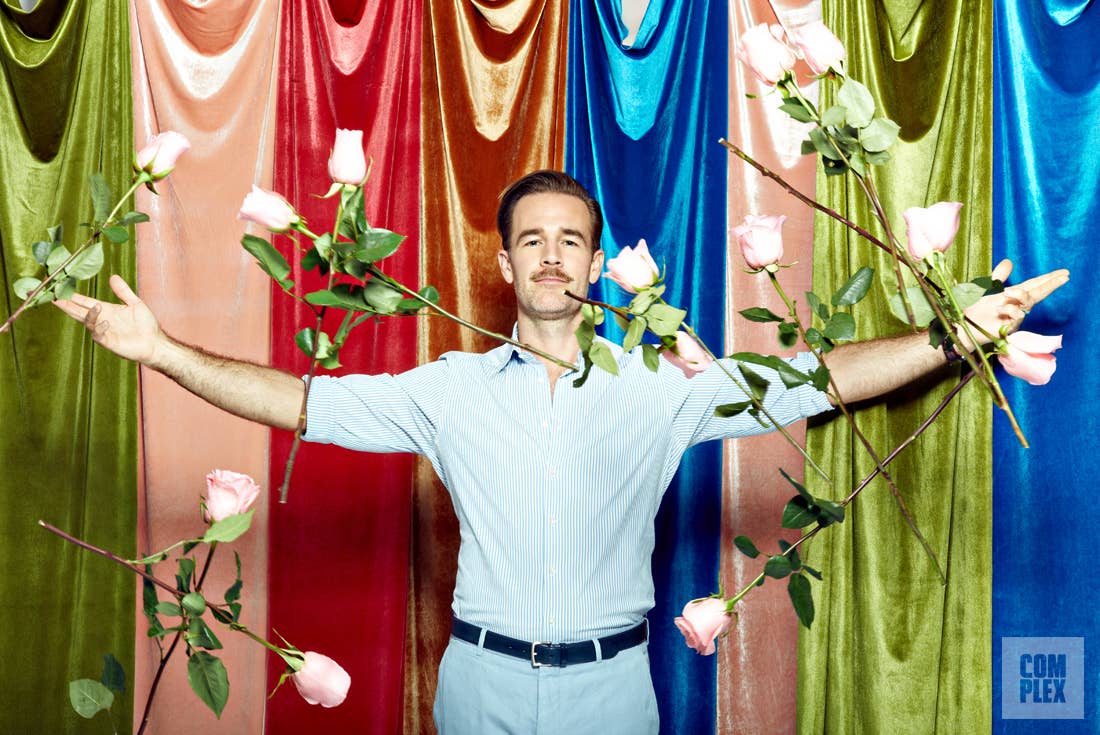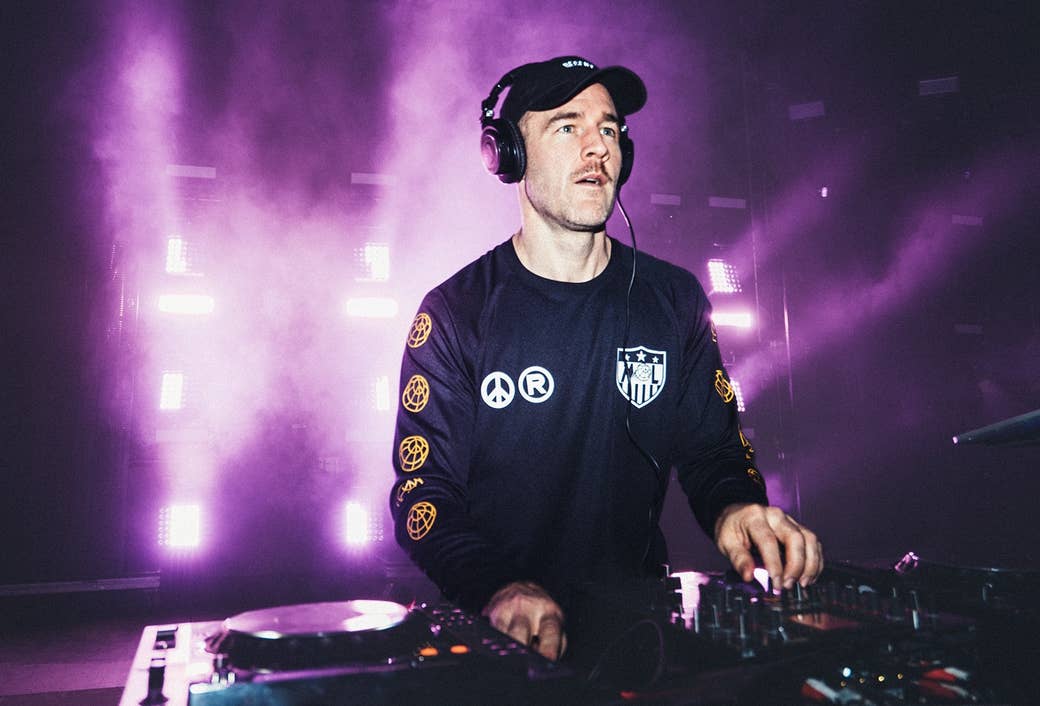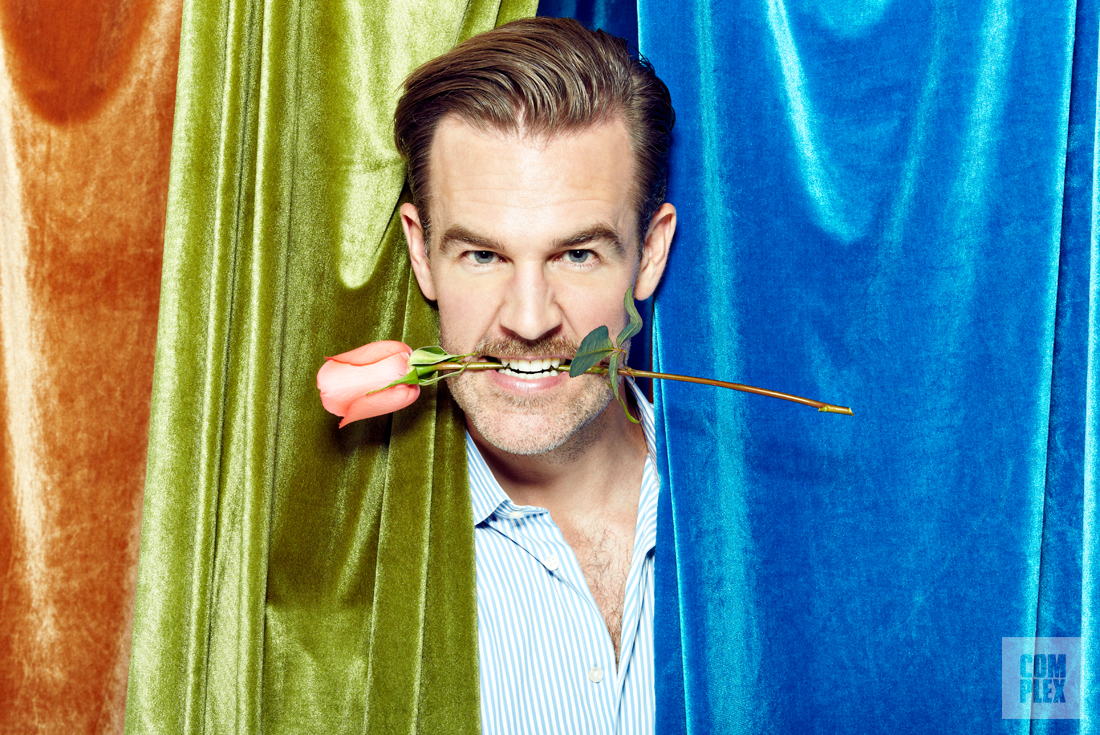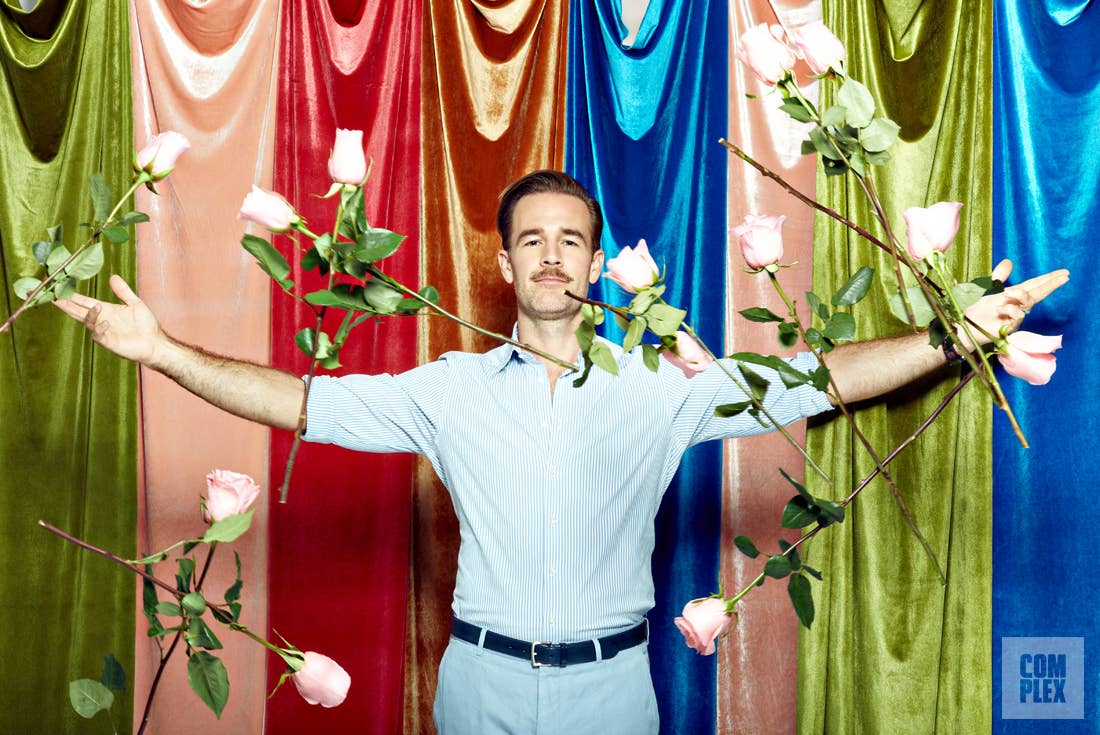
Midtown Manhattan is the antithesis of privacy—personal space is intruded upon by sheer population density and anonymity is the result. You’re just part of the crowd.
It’s approaching 85 degrees on a humid Monday afternoon in late July and I’m leading James Van Der Beek through a swarm of unsuspecting citizens, many of whom, it can be assumed, have an emotional attachment to (or at the very least, an opinion on) a beloved character of his filmography’s past. Van Der Beek’s wearing dark sunglasses and powder blue suit pants; his publicist is carrying the jacket garment as to not weigh down the actor in the heat. He’s sporting an uncharacteristic mustache, an altered appearance for his role as EDM juggernaut Diplo in the new Viceland comedy series, What Would Diplo Do? Perhaps it’s his lack of flannel or the decades that have passed since his career-defining lead role of Dawson Leery in the iconic ‘90s drama Dawson’s Creek, but we journey five blocks completely uninterrupted. Glances abound, but they remain at that. After What Would Diplo Do?, which premiered in early August, that will likely change—JVDB 2.0 will emerge, redefined by his ability to move seamlessly from Dawson to Diplo. Van Der Beek has never been a one-trick pony and he’s out to prove it.
We wander into Citizen M, a swanky hotel with an obvious affinity for the young and gauche—bright colors and angular brick-a-brack litter the walls. In the vacant courtyard, we sit for iced coffees served in tall thin glasses. It could be the company or to the location, but something about the experience feels similar to the sort of delightfully misguided narratives that exist throughout What Would Diplo Do?—it’s extravagant, and a little off. This isn’t the persona of Van Der Beek—charming from the first moment you meet him, the actor makes sure you sit before he does, he holds doors open longer than necessary to be deemed foundationally chivalrous. In conversation, charm veers into comfortability over intimidation, and it helps when he answers my first inquiry with, “Fuck, this is going to make me sound old.”

Now a dad, Van Der Beek isn’t the kind of guy who screams “EDM,” but his interest in DJ culture stems well beyond impressions. “When electronic music really started happening—this is so nerdy—I really appreciated the emotional component of it, what it can convey,” he removes his sunglasses for direct eye contact. “I knew Diplo’s music before I knew him. I heard him on NPR talking about how he approached music by infusing Latin beats. I flagged him—this guy sounds like kind of a genius.”
Last summer Brandon Dermer, an up-and-coming music video director, contacted Van Der Beek, requesting he take on the role of Diplo in an ad for the DJ’s annual touring festival, Mad Decent Block Party. The now 40-year-old actor obliged after being allowed a rewrite. (James shakes his head. “That never happens,” he assures.) Press responded strongly to the performance, not only to the physical similarities between Van Der Beek and Diplo (born Thomas “Wes” Pentz) but to Van Der Beek’s portrayal of the DJ in a three minute clip titled A Day In the Life of Diplo that acted as a perfect parody of Pentz’s glamorous life—complete with hyperbolized EDM slang. Viceland caught wind and pitched it as a series, to which JVDB immediately responded, “That’s cute, but this is definitely not a series.” He went home, sat in his pool house to consider the offer, put on some Diplo, grabbed a glass of wine, and had an epiphany of how the show could work, who his parody Diplo could become—“It’s EDM Jesus who sucks at life. It’s parables through the eyes of a clown!” he laughs. “It clicked for me.”
And thus the series became just that: DJ culture dissected with large philosophical uncertainty, always in jest. The question of Christianity literally pops up in the first few seconds of the show’s pilot episode—and is entirely Van Der Beek’s brainchild. A shirtless JVDB-as-Diplo looks over an orange California sunset and ponders the meaning of life—a place of meditation conjured from a backstage trailer at Mad Decent Block Party. His Diplo questions religious doctrine and then immediately turns his focus to social media. “The important question of our time is, ‘If Jesus and Buddha were on Twitter, who would have more followers?’” Beek laughs, repeating the line. “Buddha talks like a tweet but Jesus was more global and had more haters.”
It’s a joke that directly reflects the unusual writing behind What Would Diplo Do?, which JVBD lead with Dermer. WWDD is Beek’s first writing/showrunning project, one that allowed him to explore a new creative medium with ultimate freedom. He hired a writing team of his own—Hal Ozsan (“I’ve known him for 15, 20 years. He went to both of my weddings, wait, not the second one. He’s the only guy who was at both of my bachelor parties.”) and Jordan VanDina (“A guy with a crazy Twitter account; [he’s] a kindred spirit.”) “There were no rules. There was no template. Viceland has never done scripted comedy before,” he explains. “We’d start with long, philosophical questions and conversations about an aspect of life and its meaning. What are the other sides? What’s the counter argument? What can we boil down as a negative truth?” Van Der Beek pauses. “Then we’d just layer silliness and stupid poop jokes.”
Later in the episode, Van Der Beek’s Diplo will declare the DJ a modern day shaman. “It’s the stupidest idea in the world,” he explains. “But it’s also a little bit, maybe, true?” He pauses again, moving his hand from his lap to the empty chair next to him, gesturing as if someone were sitting there, “If Wes [Diplo] was here, he’d roll his eyes back so far in his head he’d fall over.” Van Der Beek used to mirroring the famous DJ, does it in his absence.

James Van Der Beek’s acting career took off quickly, a combination of impeccable timing and talent. In the late ‘90s he was a recent high school grad with an affinity for musicals, a 20-year-old who made his way from Connecticut to Hollywood to audition for three television pilots. He’d eventually land the lead of Dawson Leery for The WB’s 1998 teen drama Dawson’s Creek, a role that would last six seasons and forever canonize Van Der Beek as a sensitive heartthrob, a prone-to-tears character actor in a leading man’s body.
It’s been 20 years since the role, but the association persists—his role helped define The WB as a place for coming-of-age tales, and those who grew up with Dawson, grew up with JVDB—and treat him that way. “One of the things I learned early on is that you can’t micromanage. People have their relationship to whatever work you’ve done,” Van Der Beek explains. “It would be a waste of time and energy [to be concerned about it.] You go with your gut and you just move forward.” He’s learned to be grateful for his past, perhaps once burdened by it—no one wants to be in high school forever, or viewed as such—now he’s more excited than ever before for this new chapter, what could be dubbed Van Der Beek’s second wave: comedy, and more specifically, meta-comedy.
Long before What Would Diplo Do? was even a twinkle in Viceland’s eye, James was playing a satirical version of himself on the tragically short-lived ABC sitcom Don’t Trust the Bitch in Apt. 23, where “Fake James,” as he refers to his character, played BFF to protagonist Krysten Ritter, a delightfully deviant IT Girl on the verge of irrelevancy. “When we started I told [executive producer] Nahnatchka Khan, ‘Promise me one thing: that you’ll never be afraid of insulting me. You gotta go with what’s funniest. If it’s ever too much, I’ll pull you back, privately.’” Van Der Beek sits up at the thought, exuding a particular kind of authority. “That never had to happen.” He smiles, stopping his train of thought to check if I was comfortable, if we should move our conversation into the hotel lounge out of the afternoon sun. He never turns off the dazzling charm.
In playing a bastardized version of himself, Van Der Beek learned the skill set necessary to pull off a parody of another celebrity—even if the character isn’t real. “The similarities between Fake James and [my Diplo] are in the structure—it’s about balancing extremes,” he begins, taking a swig of iced coffee, now watered-down from the ice melting at the warmth of his hand. “Fake James was talented at everything he did, but everything blew up in his face. He tries to be sweet but he’s so incredibly narcissistic that that sweetness is misplaced. For Fake Diplo, it’s kind of the same thing.”
The difference is in the application—Van Der Beek’s Diplo is a musical genius who gets lost in his imagination, coming down to earth with the most inappropriate timing. He’s wise, but it’s often lost in its application—in the same way he channels hooks, those arena-sized beats, he brings about big philosophical truths—much to the dismay of the people around him. The tension makes the larger-than-life Diplo feel human, even if it’s a parody character.
That is not to say some of Van Der Beek’s Diplo wasn’t steeped in reality, the good and the ugly. “We’re not making him a hero. Not only do we take him warts and all but we invented warts that never even existed,” he says. “The fun of the character came from the blind spots: What is he not good at? It’s a full-on character with a couple kernels of truth.”
“My last job, I was carrying a gun and wearing a flack jacket for CBS. I didn’t have network parties where they gave away weed and got shut down by the cops.”
The amalgamation of Van Der Beek’s satire and reality, at moments, confronts some of Diplo’s past indiscretions, potentially sticky territory the DJ was willing to have explored. “If there’s any part of him that might not be cool with this, I wouldn’t have done it,” Van Der Beek explains. “He gave the only answer that would’ve made this worthwhile, which is, ‘just make me look completely ridiculous.’” And so he did. One episode is based entirely around a series of sexist tweets Diplo wrote about Taylor Swift in 2014—the backstory is fake; the post is not. Dermer and Van Der Beek didn’t paint Diplo as a hero, but he’s not a total villain, either. And there’s real value in keeping the mystery alive—all while outlining his life as Fake James, as Fake Diplo, as a writer of Fake Diplo, Van Der Beek keeps personal details to a minimum. The focus is on the work, and frankly, it’s working.
All of this—EDM, Mad Decent Block Party, being close with Diplo—is a far cry from the dramatic Dawson days that made James Van Der Beek a household (and wholesome) name, but it shouldn’t come as a surprise. “Comedy is how I kept sane in the early days when I was lucky enough to step into a way bigger amount of fame than I consciously set out for. That was just among my friends… I would’ve come across as an ungrateful little brat,” he reflects. “Right before Apt. 23, I looked at the [acting] landscape and thought, ‘What can I do? What doors are open to me?’”
Around that time, Van Der Beek had just gotten remarried after his 2010 divorce. He had his first of four children. He was ready for whatever opportunities would come his way. Humor was the avenue, and now that he’s exploring writing, he couldn’t be more pleased with his decision—and welcomes change in whatever form it arrives in.
“The pendulum needs to swing for me. I can’t do the same thing all the time. Between Apt. 23 and Diplo I’ve done two other wildly different series. Neither one of them successful, but they were different,” he says. “My last job, I was carrying a gun and wearing a flack jacket for CBS. I didn’t have network parties where they gave away weed and got shut down by the cops.”

Beyond the debauchery of a uncharacteristically green network party, the idea behind What Would Diplo Do? might not feel that unordinary. Comedy has had an interest in parodying music stardom for a while—from 1984’s This Is Spinal Tap which made the genre famous, to last year when the Lonely Island’s Popstar: Never Stop Never Stopping charmed audiences with its great jokes at the expense of fictionalized pop stars (and some at Justin Bieber, though he was not the focus.) But none have been written around criticisms of a real-life, living, and breathing person. There’s something inherently bold about the move, especially when the product pokes fun both at the subject and the culture that makes them famous.
In What Would Diplo Do? concepts of EDM as rock stardom is limited to live shots from Mad Decent—Van Der Beek isn’t here to glorify any of it. “A lot of this is revenge of the nerds. [DJs] are people who are alone in a room. You see this thing that’s made on a laptop and then enjoyed by 30,000 people jumping up and down,” he explains. “People are shouting, screaming things like ‘Where are you now that I need you?’ ‘Don’t let me down.’ Those are vulnerable things to be shouting at the world. That’s more interesting to me than trying to look bulletproof.” In no way does he, or Diplo, or even Fake Diplo come off as bulletproof—but perhaps in choosing these surprising creative projects, the kind that make people say “huh?” before watching an episode and quickly falling in love with it, Van Der Beek’s thirst for bigger and better challenges is impenetrable.
“At the beginning of my career, there was more thinking, ‘What can this do for me? What will this do for my career?’ That’s not much fun. In general, if you go around asking, ‘Where can I add value?’ you’re going to make better choices,” he explains. “Where can I add value?” has quickly become Van Der Beek’s work mantra, and with each left-field collaborative endeavor, it holds more weight. When the interview ends and we stand up from our table, it becomes clear that the “meta” in meta-comedy has metaphysical resonance within Van Der Beek—he believes in What Will Diplo Do?, in it’s ability to subvert people’s expectations of what a DJ is through humor. He’s having fun with it—for now. “I’m meta-comedy guy, sure, great… until the next weird thing, or the next thing people love. I’m learning a ton.” In that way, much like Diplo, he’s restless.


